
Consolo a Find on Kentucky Symphony's "Handel with Care"
Trust the
Kentucky Symphony Orchestra to do it first.
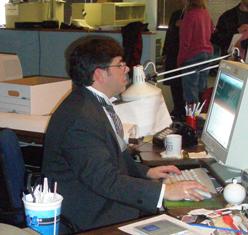
Led by associate conductor Thomas Consolo, the ever-innovative KSO presented the first “Messiah” sing along of the season Nov. 22 and 23 in Greaves Concert Hall at Northern Kentucky University.
Of the “Hallelujah” chorus, that is.
Not only was it the season's first "Hallelujah" sing along , but probably the first "Hallelujah" anywhere to make the audience the star of the show. The KSO did it by having the orchestra descend from the stage and mingle with the crowd. Scores were distributed in advance.
“How many of you have heard this chorus and wished you were up on the stage?” said Consolo at the concert's repeat on Nov. 23. “We are bringing the stage to the audience.”
For those who chose to sing along and those who didn't, it made for an enhanced Handel happening.
The "something extra" that is a part of all KSO concerts, it was part of a special “Handel with Care” program focusing on the great contemporary of Johann Sebastian Bach. There were excerpts from Handel’s operas, oratorios, concertos and sacred music, even “barge music,” i.e. portions of his famous “Water Music” written for a royal cruise on the Thames by King George I of England.
As KSO associate conductor, Consolo has led education concerts and park concerts. “Handel with Care” was his KSO subscription debut.
Familiar to audiences as the orchestra’s principal second violinist -- a post he has held since the KSO was founded by James R. Cassidy in 1992 -- Consolo demonstrated that, in addition to myriad other skills, he is a fine conductor.
For the record,
Consolo was copy editor, page designer and assistant business editor for The
Cincinnati Post until it closed in December, 2007. A computer whiz who was a physics major at
the Massachusetts Institute of Technology before deciding to cast his lot with
music, Tom helped a newsroom of Post employees cope with a new computer system and
was one of a team of three "X Post Factos" who won the Scripps Spelling Bee for
Literacy against 20 other area corporations last spring for the second year in
a row (can you spell seguidilla or guilloche?). He is the KSO's program annotator and publications director and has served as librarian and personnel manager, as well.
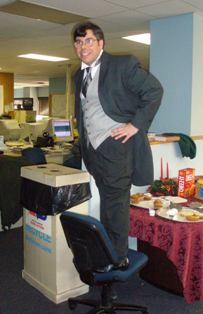
A graduate of the University of Cincinnati College-Conservatory of Music, where he earned bachelor’s and master's degree in violin performance and conducting, Consolo demonstrated clarity and ease on the podium. He lets the musicians know exactly where his beat is, with no skimping on upbeats or idiosyncrasies that might look good to an audience but could lead an orchestra astray. He conveys the feelings within the music well, too, as in the infectiously buoyant “Entrance of the Queen of Sheba” from the oratorio “Solomon” that opened the KSO concert.
Joining the KSO were the 41-member KSO Chorale, bass-baritone Reginald Smith Jr., tenor Mateo Husted, countertenor Daniel Moody and harpist Liya Huang.
The 31-piece KSO, which included Christina Haan on harpsichord, reached a “negotiated compromise” regarding baroque performance practice, said Consolo. String vibrato was not totally banished, he said, mostly because of Greaves’ dry acoustic. Still the impulse to warm each note with vibrato was hard to resist by some players, making for a rather mixed impression. Concertmistress Manami White performed her solos in the Concerto Grosso Op. 6, No. 12 with notable stylistic consistency, as she did throughout the concert, producing a clean, focused sound. Tempos were moderate, but articulation was crisp and for sheer baroque splendor, piccolo trumpeters Brian Buerkle and Bryan Crisp carried the day.
The concert was billed as an “open mike” event, an apt contemporary analogy to the solo roles taken by principal players in several works on the program, including the Concerto Grosso and “Water Music.” Oboists Peggy Grant and William Aikens, bassoonist Darrel Hale and flutist Jennifer King shone in excerpts from the “Water Music,” as did French hornists Richard Goist and Matthew Haislap (despite an occasional lapse consistent with the horn’s treacherous reputation). Timpanist Taft Hall joined the ensemble in the Suite’s more festive movements.
Like Consolo, soloists
Smith and Huang are real finds. Smith,
age 20, is a sophomore at the University of Kentucky. A native of Taiwan, Huang is studying for her
doctorate at CCM. Smith
commanded attention in three Handel arias, where he demonstrated a big natural
voice, arresting coloratura, and considerable artistry. In “Ombra mai fu” from Handel’s opera “Xerxes,”
(otherwise known as Handel’s Largo and in fact, addressed to a tree), Smith floated
a gentle voice supported by precise diction.
The effect was tender and loving in keeping with the text which begins “Tender
and beautiful fronds of my beloved plane tree, let Fate smile upon you.” (The plane tree has been much valued in the
Middle East as a shade provider). “Honour
and Arms” from Handel’s oratorio “Samson” was a total contrast with its bravado
and drama.
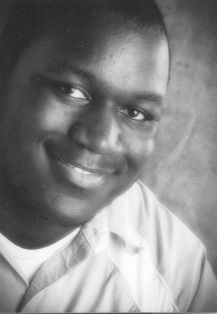
Huang was a superlative
soloist in Handel’s Harp Concerto in B-flat Major. The gracious work lay comfortably under her fingers
and she brought out a wide range of color in the Larghetto, where the harp
plays solo most of the time.
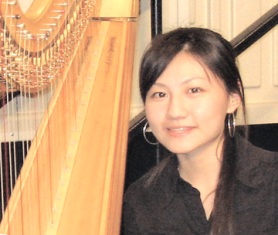
The KSO Chorale was featured in Handel’s “Te Deum laudamus,” HMV 280 (called “Queen Caroline” for the wife of George II). Sung in its Anglicized version, the six-movement hymn suffered some insecure moments, but overall, showed off the choir to good effect. In the final “O Lord, in Thee Have I Trusted,” they made a joyful noise indeed.
Another find on the concert was a rare one, countertenor Daniel Moody, who demonstrated a pristine, serenely beautiful voice in “When Thou Tookest upon Thee to Deliver Man” and “Vouchsafe, O Lord, to Keep Us This Day without Sin” from the “Te Deum.” A Cincinnati Arts Association Overture Award winner as a tenth grader in 2006, Moody became a Young Arts Winner in Classical Voice for the National Foundation for Advancement in the Arts in 2007. The home schooled Cincinnatian appears to have a bright future ahead of him.
Sharing the soloist spotlight in “Te Deum” was Husted who lent his lyric tenor to “The Glorious Company of the Apostles Praise Thee.”
Smith and trumpeter Buerkle returned to end the concert with a stirring performance of “The Trumpet Shall Sound” from “Messiah. Buerkle, as he did all afternoon, ornamented his lines with great taste and beauty. Smith followed suit in the last bars of the aria, preparing the crowd for the jubilation and excitement of “Hallelujah.”
Consolo preceded the concert by acknowledging his mentors at CCM, both whom recently passed away, conductor Gerhard Samuel and violinist Connie Kiradjieff.
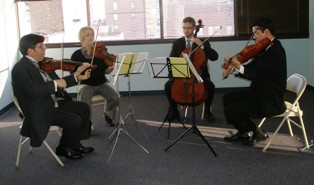
The KSO’s next concert will be “The Hunchback of Mantua,” a concert performance of Verdi’s opera “Rigoletto,” Jan 9 in Greaves Hall. Leads will be sung by soprano (and CCM graduate) Elizabeth Roberts as Gilda, tenor Marc Schreiner as the Duke and baritone Stephen Gaertner as the jester Rigoletto. All are young American artists on the rise. Members of the University of Kentucky Opera Theater will sing supporting roles. Tickets are $28 and $23, $18 for seniors, $10 for students. Call (859) 431-6216, or visit www.kyso.org.